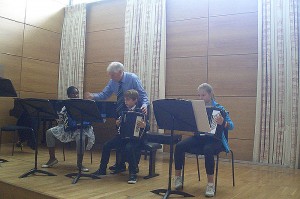
Prof. Owen Murray and Lars Holm with participants at the Royal Academy of Music 25th anniversary celebrations
The major theme of Owen Murray’s celebration of 25 years of the Accordion Department at the Royal Academy of Music, on Sunday 10th June, was accordion teaching. His special guest for the occasion was Lars Holm, an accordion teacher from Sweden, well known throughout the world from Denmark to Reykjavik, from Rio de Janeiro to Tokyo and many other places. Holms’ great talent lies in his infectious enthusiasm for teaching young children. He has developed several teaching books for beginners to play small free bass button accordions. Practice for young children must above all, he says, be made fun. He demonstrated this by accompanying children with simple folk tunes whilst they played beginners exercises. Murray and Holm developed a strong case for starting children with a small three row free bass button accordion. Such a small instrument can be handled by a young child when properly held, without any appearance of clumsiness. ‘Whilst I teach students with piano/C system free bass, piano/B system free bass and chromatic button with either C or B systems ‘ says Owen Murray ‘my preference is for a button C system in both hands. If children start this way, when they progress to a larger convertor instrument the standard bass system is very easily mastered and there is no difficulty with co-ordination.’ Both Owen Murray and Lars Holm gave demonstrations with a number of young people who appeared to enjoy themselves very much, both playing solo and playing together.
After lunch there was a splendid concert given by present students, together with immediate past student Ksenija Sidorova. A wonderful level of musical achievement was demonstrated with baroque and classical works by Scarlatti, Mozart and Grieg and with modern accordion works by Bent Lorentzen, Franck Angelis and Petr Londonov. The Academy students followed their concert with a demonstration performance class with more mature students attending. Constructively criticising performances with ideas for general shaping of a piece, phrasing and tempo of works is an essential part of student training. They are required to give constructive analysis to enhance performance of works they may not have played themselves. After a tea-break students gave a further concert of mainly modern solo accordion and chamber works, finishing with a magnificent performance of a highly emotional and descriptive modern work, Viktor Vlasov’s ‘Gulag’ by past student Milos Milivojevic. In the final session of the day entitled ‘Raising playing standards in the UK’ Owen Murray began by pointing out how the majority of his students in recent years came from abroad. Success in obtaining students of suitable standard for Academy entrance from the UK had been small over the years and non-existent recently. On the other hand standards of entrants from overseas had gone up and up. The main bar for overseas students was sources of funding. Mr Romano Viazzani was invited by Owen Murray to lead a discussion. Owen Murray pointed out the enormous difficulty he had had over the years, first with the Associated Board of the Royal Schools and then with the Trinity and Guilds in getting the adoption of an approved syllabus with the very great advantages in musical education for young accordionists that this brings. Having finally got a syllabus adopted by Trinity and Guilds a year or so ago it has now been cut to an extent below requirements, through lack of support. A major idea put forward by Romano Viazzani to improve the situation was the possibility of forming an ‘Accordion Teachers Association.’ Such an Association would have the principal aim of raising the number and standard of young people learning to play the accordion. It would be open to all who practice teaching the accordion. It would have a constitution and seek funding. Its aim would be pursued by organising events for teachers in different parts of the country, courses, demonstrations, discussions of problems with the syllabus and repertoire. It would seek to raise sufficient funds to acquire a number of small instruments for hire for children’s use. A major problem identified was that small accordions were very expensive instruments for parents to acquire for an initial few years when progress of a child may be uncertain.

Charity status of the society would be required to obtain sponsorship on a sufficient scale to run a scheme for the hiring of instruments on a reasonable scale.
The meeting left the matter after discussion of many issues for Romano Viazzani to make further soundings of teachers and schools and to convene a further meeting with the idea of a teachers association put into a concrete set of proposals. It is appropriate to conclude this report with sincere congratulations to Owen Murray on his outstanding achievement over 25 years. The Accordion Department at RAM is small but Owen has successfully integrated it into the life of the Academy and made it one of the best places to study the accordion at conservatoire level in the world. He has won great respect from his colleagues and admiration from his students. Out of 21 graduates from his department 10 have graduated with distinction and seven have gone on to achieve the prestigious Diploma of the Royal Academy. His pupils have also received many prizes in the world of classical music and played with many front rank orchestras and in numerous festivals and events which have brought recognition for the accordion. Many congratulations to Owen from all his students and all accordionists.Many problems were discussed including the decline in musical instrument teaching generally through competition from other activities.

 English
English Italiano
Italiano 






Leave a comment
You must be logged in to post a comment.